高级英语近义词辨析
高中英语语法:英语近义词辨析
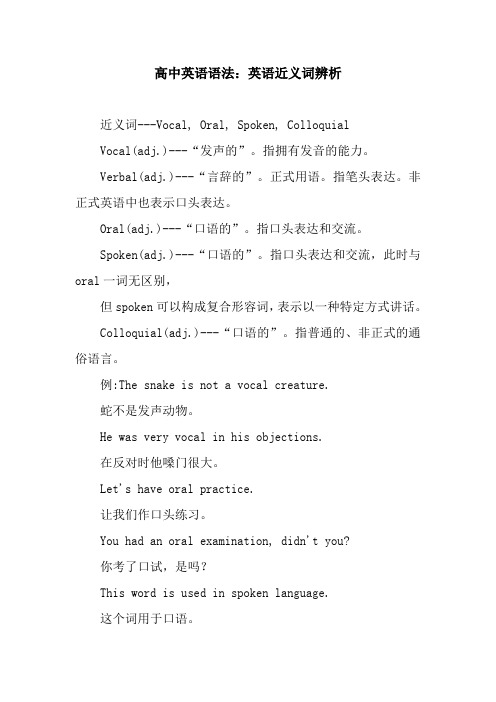
高中英语语法:英语近义词辨析近义词---Vocal, Oral, Spoken, ColloquialVocal(adj.)---“发声的”。
指拥有发音的能力。
Verbal(adj.)---“言辞的”。
正式用语。
指笔头表达。
非正式英语中也表示口头表达。
Oral(adj.)---“口语的”。
指口头表达和交流。
Spoken(adj.)---“口语的”。
指口头表达和交流,此时与oral一词无区别,但spoken可以构成复合形容词,表示以一种特定方式讲话。
Colloquial(adj.)---“口语的”。
指普通的、非正式的通俗语言。
例:The snake is not a vocal creature.蛇不是发声动物。
He was very vocal in his objections.在反对时他嗓门很大。
Let's have oral practice.让我们作口头练习。
You had an oral examination, didn't you?你考了口试,是吗?This word is used in spoken language.这个词用于口语。
She is a soft-spoken woman.她是一个说话柔和的女人。
This is a colloquial expression.这是通俗用语。
He studies English colloquial style.他研究口语体的英语。
近义词---View, Scenery, Scene, SightView(n.)---“景色”。
普遍用语。
指目中所望见的景色。
Scenery(n.)---“景色”,“外景”。
指一个地方乃至一个国家的整个外景或外貌。
Scene(n.)---“景色”。
可与view通用,但多包括了其中的人及其活动。
Sight(n.)---“光景”。
多指人工的事物,比如大建筑史迹等有名的处所。
例:There is a fine view of the mountain from our hotel window.从我们旅馆的窗口可以看到秀丽的山景。
高考英语30组相近词语辨析
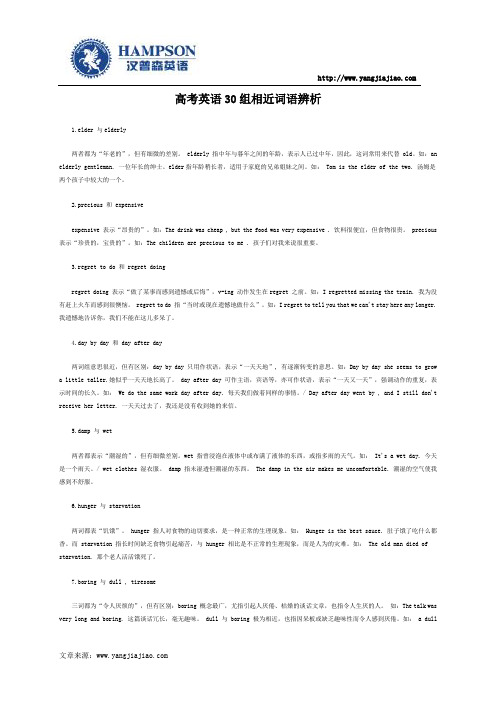
高考英语30组相近词语辨析1.elder 与elderly两者都为“年老的”,但有细微的差别。
elderly 指中年与暮年之间的年龄,表示人已过中年,因此,这词常用来代替 old。
如:an elderly gentleman. 一位年长的绅士。
elder指年龄稍长者,适用于家庭的兄弟姐妹之间。
如: Tom is the elder of the two. 汤姆是两个孩子中较大的一个。
2.precious 和 expensiveexpensive 表示“昂贵的”。
如:The drink was cheap , but the food was very expensive . 饮料很便宜,但食物很贵。
precious 表示“珍贵的,宝贵的”。
如:The children are precious to me . 孩子们对我来说很重要。
3.regret to do 和 regret doingregret doing 表示“做了某事而感到遗憾或后悔”,v-ing 动作发生在regret 之前。
如:I regretted missing the train. 我为没有赶上火车而感到很懊恼。
regret to do 指“当时或现在遗憾地做什么”。
如:I regret to tell you that we can't stay here any longer. 我遗憾地告诉你,我们不能在这儿多呆了。
4.day by day 和 day after day两词组意思很近,但有区别:day by day 只用作状语,表示“一天天地”, 有逐渐转变的意思。
如:Day by day she seems to grow a little taller.她似乎一天天地长高了。
day after day 可作主语,宾语等,亦可作状语,表示“一天又一天”,强调动作的重复,表示时间的长久。
如: We do the same work day after day. 每天我们做着同样的事情。
英语近义词辨析大全
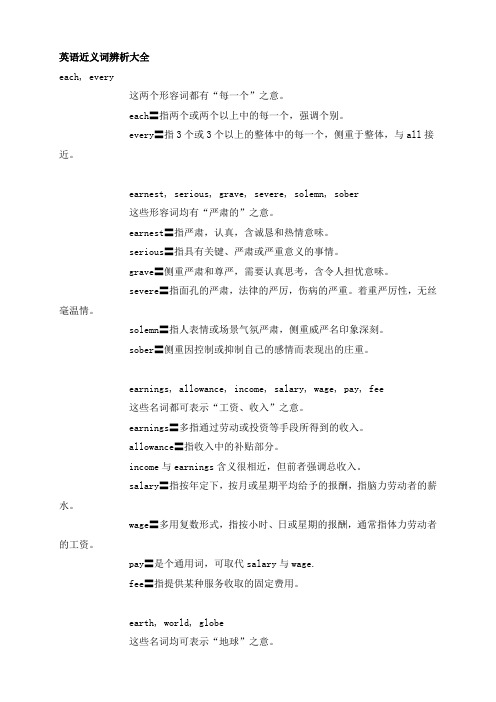
英语近义词辨析大全each, every这两个形容词都有“每一个”之意。
each〓指两个或两个以上中的每一个,强调个别。
every〓指3个或3个以上的整体中的每一个,侧重于整体,与all接近。
earnest, serious, grave, severe, solemn, sober这些形容词均有“严肃的”之意。
earnest〓指严肃,认真,含诚恳和热情意味。
serious〓指具有关键、严肃或严重意义的事情。
grave〓侧重严肃和尊严,需要认真思考,含令人担忧意味。
severe〓指面孔的严肃,法律的严厉,伤病的严重。
着重严厉性,无丝毫温情。
solemn〓指人表情或场景气氛严肃,侧重威严名印象深刻。
sober〓侧重因控制或抑制自己的感情而表现出的庄重。
earnings, allowance, income, salary, wage, pay, fee这些名词都可表示“工资、收入”之意。
earnings〓多指通过劳动或投资等手段所得到的收入。
allowance〓指收入中的补贴部分。
income与earnings含义很相近,但前者强调总收入。
salary〓指按年定下,按月或星期平均给予的报酬,指脑力劳动者的薪水。
wage〓多用复数形式,指按小时、日或星期的报酬,通常指体力劳动者的工资。
pay〓是个通用词,可取代salary与wage.fee〓指提供某种服务收取的固定费用。
earth, world, globe这些名词均可表示“地球”之意。
earth〓指表面有陆地和水,人类所居住行星的名字。
有时与“天”相对,泛指“地”。
world〓通常相当于earth与globe,现多用指地球,地球上的世界,社会和人。
globe〓指我们生活的地球,但强调其实体和圆形。
earth, clay, dirt, land, dust, soil, mud, ground这些名词都有“土地,土,泥”之意。
earth〓多指地表带有水分的泥土,较具体。
高考英语近义词辨析
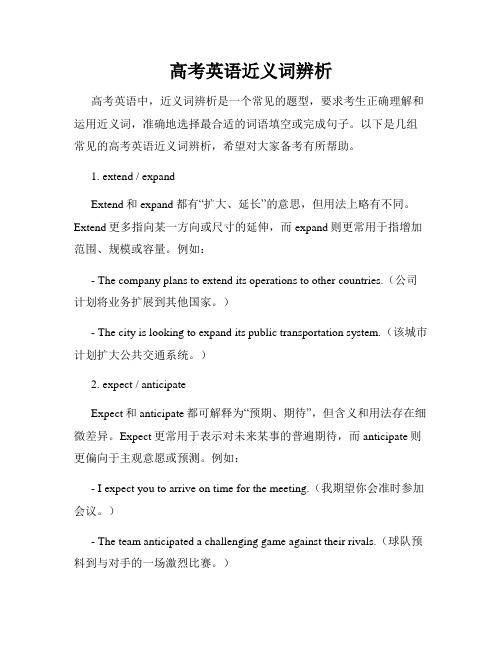
高考英语近义词辨析高考英语中,近义词辨析是一个常见的题型,要求考生正确理解和运用近义词,准确地选择最合适的词语填空或完成句子。
以下是几组常见的高考英语近义词辨析,希望对大家备考有所帮助。
1. extend / expandExtend和expand都有“扩大、延长”的意思,但用法上略有不同。
Extend更多指向某一方向或尺寸的延伸,而expand则更常用于指增加范围、规模或容量。
例如:- The company plans to extend its operations to other countries.(公司计划将业务扩展到其他国家。
)- The city is looking to expand its public transportation system.(该城市计划扩大公共交通系统。
)2. expect / anticipateExpect和anticipate都可解释为“预期、期待”,但含义和用法存在细微差异。
Expect更常用于表示对未来某事的普遍期待,而anticipate则更偏向于主观意愿或预测。
例如:- I expect you to arrive on time for the meeting.(我期望你会准时参加会议。
)- The team anticipated a challenging game against their rivals.(球队预料到与对手的一场激烈比赛。
)3. generate / produceGenerate和produce都可表示“产生、制造”,但有所区别。
Generate更常用于指创造、产生新的事物或概念,而produce则更倾向于指生产、制造实物。
例如:- The new technology will generate more job opportunities.(新技术将会产生更多的就业机会。
)- The factory produces over a thousand cars each month.(该工厂每月生产一千多辆汽车。
英语四级近义词辨析

近义词:pierce 猛戳、猛插入、猛刺入fierce 激烈的、猛烈的fierce competitionstrained 紧崩的、拉紧的be critical of 对...进行批评、挑剔errors = mistakes/sth. done wronglysteamed bread 馒头fault 错(指人的性格、行为或习惯上的缺点)shortcomings - (反)merits 指在学校中老师作评语时给出的优缺点flaw 指物体或材料上的瑕疵rise和arise都是不及物动词。
raise vt. 提高、提升;饲养、抚养raise the flagraise childrenraise pigsrise 指太阳、旗帜、水位等的上升(具体概念)arise 指抽象概念的一种出现artificial false unnatural unrealartificial 人造的、人为的e.g. artificial legleather 皮革e.g. artificial leatherunnatural 形容人的行为举止不自然;不正常的e.g. a bird of unnatural sizefalse 假的(具有欺骗性的)e.g. false passportfalse hairfalse teethunreal 虚幻的e.g. unreal worldgive present promise grant credit entitle give sb. sth./give sth. to sb.e.g. give me a book/give a book to megrant sb. sth. 正式的授予e.g. He granted me one mao. (错)grant 资助take sth. for granted 把...看作是理所当然entitleentitle sb. to do sth./entitle sb. to sth.credit 学分credit card 信用卡credit A to B 把A归咎于Be.g. credit the car accident to the driver's carelessnesspresent 赠与、给与e.g. present withpromisepromise to dopromise sb. sth.e.g. give me a bookI was given a book.A book was given to me.mild light slight tendermild 温柔的= gentle;吃的东西不辣的spicy 麻辣soft 柔软的e.g. soft drink - hard drinkslight 轻微的、少许的e.g. A slightest change of the schedule may affect everyone. simplest 最最简单的slightest 最轻微的、最少许的leastat least 至少light - (反)heavylight 清淡的、容易消化的tendertend + to 趋向于tender (肉)嫩的laziness idleness povertylaziness - lazy 懒惰poverty - poor 贫穷、穷困inability 无能力idleness 游手好闲idle 闲置(的)e.g. idle capital 闲置资本idle away some time 虚度光阴kill time 消磨时间nuisance worry trouble anxietynuisance 指具体的令人讨厌的东西trouble 指代的是一种problemworry和anxiety都是永陪词汇crash clash smash ash wreck accident spot pollute staincrash 表示飞机的失事wreck 轮船的失事accident 汽车的车祸spoil 宠坏、惯坏injure 在事故中受伤wound (刀、枪等)伤hurt (感情、情感的)伤e.g. You hurt my feelings.My leg hurt.hurt oneself 自残spot 使...有污点;污点、污迹(点状)e.g. spotted dogchip – chopstain 弄脏、染色(片状污迹)debate consult dispute bargaindebate 辩论consult 咨询consultant 顾问dispute 反驳beyond dispute 无可争辩bargain+ with sb. 与某人讨价还价+ about sth. 就...讨价还价答案:Dvalid vain vacant empty vague hollow bare blank valid 具有法律效力的vacant没人占用而空暂时没有充满而空(反)occupiedempty 空空如也的,什么也没有vainin vain 徒劳,白费力气blank 因为没写字而空hollow 中空的、空心的- (反)solidbare 光秃秃的(一般形容土地)bald答案:D动词和动词短语1、turnturn down 将音量关小;拒绝turn up 把音量开大;出现turn out 结果是、证明;生产turn over 移交、转交(没有方向性)turn to 求助于;参考turn in 交给、上交turn on 打开(电视机)look out = be carefultake care 当心、小心make out1、= understand 理解、领悟2、= hard to recognize 费力的辨认出3、开具支票make out a checkgo over1、复习2、仔细检查答案:C2、makemake outmake for 朝...走去make off 匆匆地离开某地、逃走make up组成、构成+ 数字/百分比be made up of 组成、构成(被动)补考缓考make it = succeed in doing sth.make up for 弥补、补偿stick to strike at strive to strive forstuck tostick to(介词)坚持e.g. Stick to the end and you will make it.strove forstrive for 为...而努力e.g. Don't strive for perfection.struck atstrike atcurse at 咒骂fire at 冲某人开枪shout at 冲某人大喊struck atstrike at 抨击、批评come up with put up with catch up with keep up with put to rest stand up to = put up with 忍受tolerate/stand/bearcome up with 提出建议、提出想法catch up with和keep up with大多数时可互换catch up with 赶上、追上keep up with 跟上come up against 突然遇到反对、困难等等live up to 按照...形式have a great deal of trouble 做某事遇到麻烦+ (in) doing sth.resist sustain tolerate undergoresiste.g. water resistant 防水resist 抵制、防+ doingsustain 供养undergo 经历、遭受3、taketake after 在外貌,性格等方面与父母相像take apart (将大型机器)分解,拆开take back 收回= withdrawe.g. I'll take back what I said.take down= write/put/set down 记下、写下(将大型机器货物件)分解take effect 生效take effective steps/measures采取有效措施take sth. for granted 把...看作理所当然take in= understand 理解、领悟= absorb 吸收= cheat 欺骗take off 脱下;(飞机)起飞take on承担责任等等= employ 雇佣呈现e.g. Beijing will take on a new look in 2008.take out 抽出、取出、拿出take part in = participate inlay out lay off lay down lay aside lie/lied/lied 说谎lie/lay/lain 躺;位于lay/laid/laid 放置lay out 安装、布置lay off 解雇lay aside 搁置lay down 放弃5、callcall for 要求、需求call in 约请、约进、叫进来call off 取消= cancelcall on= visit号召call out大声叫喊向...挑战call up动员、召集打电话使人想起gogo off离开爆炸断电go after追捕追求 e.g. teenager/guygo along with支持、赞同陪同某人前往go (a)round四处走走(消息等)传开go back on 违背go by时间的流逝遵守、遵循go for去拿、去请袭击适用于go into= investigate 调查、研究谈及、谈论go out熄灭put out (被动)熄灭go over= review 复习仔细检查go through遭受、经历(苦难等)审查pull off pull out pull up pull overpull out使车辆、船等驶出、划出拔出、拔掉pull up 使车辆等停下来pull through 帮助病人恢复知觉pull over 使车辆、船等闪到一边go up 上升、上涨go with陪...一起行事与...协调一致、匹配reakbreak through取得突破型进展突围、突破break away + from 与某人脱离关系e.g. His father decided to break away from his son.break down(机器等)损坏汽车抛锚(谈判等)破裂(人)垮掉break into 破门而入break off 中止、中断break out (火灾、战争、疾病等)爆发e.g. bird flubreak up打碎、粉碎中止、结束givegive away赠送泄露秘密give back 归还give in 屈服、让步= yield togive off 指烟、热、光等的散发、释放give up 放弃= abandongive out = hand out 分发、发给改变change alter transfer vary shift convertalter 强调局部的改变e.g. The trousers should be altered.shift 倒班、换班e.g. day/night shifttransfer 强调位置上的改变transmit 疾病的传播;电视节目的转播exchange 强调两者之间的转换e.g. foreign exchange ratesinterchange 表示一对多e.g. interchange stationremove 去除、除掉+ from答案:Cvary 强调差异性的变化various = all kinds of 各种各样的varied 强调不同的distance scope range boundarydistance 空间距离e.g. Ten miles is a long distance.scope 做某事的余地、处理某事的范围telescope 望远镜boundary 分界线zone 地域、地带gap length distance interval border margin boundary frontier interval 时间或空间上的间隔at intervalsmargin 书两边的空白页border 边界edge边缘刀刃gap 强调地理或情感上的差距generation gaplength/strength形近词attention attraction appointment(date) arrangementattention 注意力pay attention toattraction 吸引力e.g. attracted one's attentionappointment 正式的约会date 男女之间的约会constantly consistently continuously continually gradually unceasingly consequently = thereforecontinuously 连续地(没有间断性)continually 连续地(有间断性,时断时续地)unceasinglygradually = step by step 逐渐地、逐步地constantly 始终如一地、恒定地;总是constant temperatureconstantly 始终如一地、恒定地;总是e.g. He is constantly disturbing me.consistently 一贯地transmit transport transplant transform transfer deliver tradition 传统transplant 移植transport 运输transform 变革transmit 从一个地方送到另一个地方emittransfer 强调位置上的移动prefer prior superior inferior subordinatepreferable 更合适的、更适合的、更喜欢的具有比较意义的形容词:1、不与more、er连用2、不与than连用,只能与to连用superior to - inferior tosecond to e.g. I'm second to none.sensitive toprior to = beforefavorable 有利的proper 恰当的(adv. properly)suitable + for 没有比较级的意思preferable 有..比..更合适的意思considerable 量相当大的considerate 考虑人或体贴人的一种程度significant considerable(considerate) enormous numerous immense significant 意义重大的= importantenormous 一般形容体积庞大的、巨大的numerous1、+ 可数名词复数2、+ 单数可数名词clash:撞击crash:(飞机)坠毁,(轮船)失事smash:粉碎,击碎ash:废墟,灰烬ashamed:羞愧的cash:现金恐怖分子驾驶飞机撞(clash)到世贸大楼,飞机失事(crash) ,余波把大楼击碎(smash),整个世贸大楼变成废墟(ash),小布什感到很羞愧(ashamed),需要花很多现金(cash)来恢复美国经济。
高级英语同义词解析
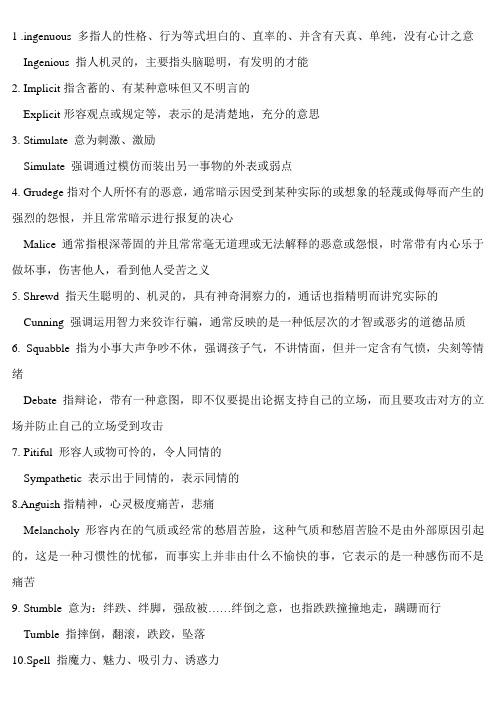
1 .ingenuous 多指人的性格、行为等式坦白的、直率的、并含有天真、单纯,没有心计之意Ingenious 指人机灵的,主要指头脑聪明,有发明的才能2. Implicit指含蓄的、有某种意味但又不明言的Explicit形容观点或规定等,表示的是清楚地,充分的意思3. Stimulate 意为刺激、激励Simulate 强调通过模仿而装出另一事物的外表或弱点4. Grudege指对个人所怀有的恶意,通常暗示因受到某种实际的或想象的轻蔑或侮辱而产生的强烈的怨恨,并且常常暗示进行报复的决心Malice 通常指根深蒂固的并且常常毫无道理或无法解释的恶意或怨恨,时常带有内心乐于做坏事,伤害他人,看到他人受苦之义5. Shrewd 指天生聪明的、机灵的,具有神奇洞察力的,通话也指精明而讲究实际的Cunning 强调运用智力来狡诈行骗,通常反映的是一种低层次的才智或恶劣的道德品质6. Squabble 指为小事大声争吵不休,强调孩子气,不讲情面,但并一定含有气愤,尖刻等情绪Debate指辩论,带有一种意图,即不仅要提出论据支持自己的立场,而且要攻击对方的立场并防止自己的立场受到攻击7. Pitiful 形容人或物可怜的,令人同情的Sympathetic 表示出于同情的,表示同情的8.Anguish指精神,心灵极度痛苦,悲痛Melancholy 形容内在的气质或经常的愁眉苦脸,这种气质和愁眉苦脸不是由外部原因引起的,这是一种习惯性的忧郁,而事实上并非由什么不愉快的事,它表示的是一种感伤而不是痛苦9. Stumble 意为:绊跌、绊脚,强敌被……绊倒之意,也指跌跌撞撞地走,蹒跚而行Tumble 指摔倒,翻滚,跌跤,坠落10.Spell 指魔力、魅力、吸引力、诱惑力Appeal 指一般的额感染力,吸引程度不如spell强烈11.On the whole 意为:总的看来,大体上,指对多个事物权衡后得出结论As a whole 意为:作为一整体,整个看来,前面往往有一个表示集体意义的名词12.Confine 强调禁止或不能通过的边界,常表达严格的约束、遏制的含义,并带有限制,束缚等含蓄意义Limit 表示限制,通常指对时间、空间、数量、能量或产品等预先做出规定13.Meet 指一般意义的遇到,碰见Encounter 表示遇到坏的事情,尤其指危险或困难的等14. Coverage 指新闻报道Report 报道,汇报,报告,其质量和范围都不及converage15.Justifiable 指在法律和道义上可证明为正当的,无可非议的,情有可原的Justified 有理由,合情合理,正当的16.Interrelate 意指使相互联系、使有关联,多指抽象的联系Interconnect 意为使相互连接,相互联系,多指具体事物间的联系、连接17. Base 指认….. 为基础,把……作为根据,把基地、总部设在Establish 指组建或成立一个机构,并正式、永久的固定下来18. Difficulty adversityDifficulty 指任何困难Adversity 通常指严重的或连续的不幸的厄运或灾难19.False 指不正确的,错误的,有时也表示虚伪的、欺骗性的,多用来形容具体事物Fraudulent 所指的欺骗行为或做法带犯罪性质的,目的在于获得他人的财产,权力等20.Conserve 指使保存完好、不受损,也表明被保存的队形,一旦用完就很难再有别的替代物了,含节省、节约之意Preserve 指想办法保存起来或保持原样,它强调的是抵制破环因数的想法Reserve 指存留起来以派别的用场21Pleat 指布料上出现的折线或皱褶Wrinkle 指因揉抓等出现的暂时性的皱褶,也指皮肤皱纹22. Care for 喜欢,为……担忧Mind 介意、反对23. Unconcerned 漠不关心的,无忧虑的Unbent 不顺从的,松弛的,放松的24. Keep from 避开,阻开,防止,克制,抑制Keep to 局限于Keep to oneself 不与人交往,不把…..讲出来25.go to pieces 瓦解(在身体,精神,道德方面)崩溃,垮掉Break to pieces 使成为碎片26. falter 表示因犹豫或恐惧等原因而声音颤抖或支吾结巴Waver 强调犹豫不决,目的不明,也表示看得见,摇晃,不稳定的运动过程27. nervous 指敏感易激动的,担心的,但有的Fidgety 指手脚或身体不停地动以烦躁,不能潜心工作,常由紧张,无聊引起的28.scrbu 指用力擦洗,擦净,刷掉Brush 指在物体表面用刷子轻轻地将触到的东西擦掉,有时指动作轻的使人感觉不到,或并不接触地擦过29.flick 指用鞭或指尖等轻击,轻弹Pluck 摘,抓,拉30.twiddle 指无聊的或心不在焉的旋弄,捻弄,摆弄,也指轻轻的转动Whirl 旋转,急转,突然转向31.toss 轻松,随便,常常是无目标地扔,还表示上下左右地抛Throw 指一般的抛,扔,投,有时两者可替换32.put down 贬低,奚落,使窘迫Put off 使不高兴,使泄气,使对…..失去兴趣33. demand 一般常用来表示有权力的人物要求别人服从或顺从Command 指来自具有绝对权威的人的正式命令,被命令的人有听从,服从的命令的义务34.resemblance 相似之处,相似程度,形似物,肖像,画像Similarity 相仿性,类似性,形似事例,暗指不同之处有时可忽略35.warlike 常用于说明导致或伴随实际战争的感情,行为,活动等,暗示好战或准备战争到底Militant 指富于战斗性的,但很少带有追求权力的含义,通常指献身于某个事业或活动,以及劲头十足,自我牺牲地追求该目的36.customary 常指有特色的,形容通常的或流行的做法,传统,用法等Habitual 形容人习惯形成的品质或行为37. prove 意为证明,验证某个事物的真实性,它不仅适用于对论点、结论的验证,而且适用于对人对物的检验Qualify 使合适,使具有…..资格38. demonstrate 指通过给予证明或做出示范来清楚地表明,主要适用于感情诸如热情,激动、奔放等外部表现Manifest 指非常准确、无误地表明,无需任何查询就能直接表现出来39. think 指为了形成见解或得出结论而进行的思想活动Reflect 深思,考虑,经深思后认识到,思考程度比think要深40.differentiate 表示通过仔细比较事物的特征或特点察觉出事物间的特殊差别Differ 指意见、观点相反,缺乏共同点41.on guard 警惕,提防Off guard 不提防,丧失警惕42. excel 常与at,in连用,多指在某些好的或令人羡慕的事务上及技能上比他人更优越,更杰出Surpass 指在数量上或程度上超出,也可以表示在能力上或素质上比他人优越43.contribute 捐助,贡献,促进,投稿Attribute 把……归于44. hostility 表示一种敌对或不友好的态度Rivalry 竞争,抗横,竞赛,赶上或超过别人或其他成就的竞争行为45.keep 保存,保留,暂时保管,存放,储存Hoard 私藏,尤其指在不必要,不允许的情况下私藏46. poverty 贫穷,贫困,也可以指各种形式,不同程度的经济贫困Impoverishment 指人的精力耗尽,土地的肥力或事物的效益丧失等47.tiresome 指因某事无聊无趣,使人提不起精神而容易感觉疲劳,是人对事物的反映Tiring 形容引起疲劳的事物,含客观意义48. obtain 强调在得到,获得,达到目的时的计划性和技巧性,也暗示着如果能够得到或得到之后的满足感Derive 指从某处获得,来自某处,含有由低向高发展,进化之意49.Tremble 指人因恼怒、恐怖或激动等缘故而不能自己时人体不由自主地抖动,也指一种快速的、轻微的抖动,但含不安,心绪不行之意Jerk 指有力,突然而粗暴的动作50. to one’s feet 起来On one’s feet 站立,起立,行走,也指经历困境后恢复,病后复原,也可以指自立,经济上独立51. burden 指使人感到痛苦,难忍的,强加的负担,也指给心理上和精神上增添麻烦Load 指大量给予,由于过剩使人感到多余,成为负担52.devote 侧重个人的感情或倾向的贡献或奉献Dedicate 侧重思想意识,也指把事物奉献给某人,表示尊敬或纪念53.creditable 值得赞扬的,带来荣誉的,可尊敬的Credible 指人、话等可信的,可靠的54. reasonable 指人或其行为通情达理的,合理的,明智的Judicious 明智而审慎的,有见地的,意味着能够区分事实和假象,能够摆脱倾向性55.retell 再讲,重述,以不同方式或语言复述Reiterate 反复重申,即几次或多次重复地说56.docile 强调生性愿意屈服于权威的性格,可以用于人或动物,特别着重于可教育性Obedient 表示顺从某个人或某种权力,这种顺从是出于对某种权威的隶从与接受57.questionable 指事物真正值得怀疑、批评或剖析Problematical 仅指没有把握,说不准,成问题,未定的58.free 适用于人,也适用于物,指恢复其自由Release 指将人或动物从某种束缚中解脱出来,以恢复其自由,也指情绪上解脱59.grab 经常表示用力或使用暴力,含有无视他人权力或社会准则,公然地或不择手段地去得到自己想要的东西Grasp 用手、爪子或牙齿紧紧抓住、咬住60.execute 实行、实施,执行或使生效,但所指对象较复杂,所做的事需要专业技术或技巧Perform 履行,执行,与do同义,但比do正式得多,可指履行义务,职责或执行命令61. leave 留下,剩下,交托,遗留给Remain 强调其他的人或事物走了,没了或被拿走了之后还有人或物存留下来62.rugged 常指人外表粗矿而身体强健,能吃苦耐劳的,机器等坚固耐用的Dogged 用于人或其特性,表示在困难面前不屈不挠63.transmission 传送、输送、传递、传播Transition 过渡、转变、过渡时期、变革等64.conscious 指自己意识到某事,也可指有意的或自愿的行为Conscientious 形容人们主动遵守道德规范,并借以指导自己的行为65. amenity 特别指使人愉快的温和或柔和,还指令人舒适且方便的设备或条件Ambience 仅指一种气氛,格调,强调周围的环境66.unfailing 表示经久不衰,不倦的,用不完的,无穷无尽的,永恒的Lasting 表示持久的,耐久的状态,强调潜在的能达到无穷尽的能力的状态67.weigh 表示压力,负担,指痛苦,恐惧,角落等因素对精神构成压力,使人感到压抑沮丧Weight 指在某些方面增加额外重量和压力,不包括精神上增加负担68.move 主要用来表示位置变化中所涉及的运动或活动Remove 比move具体,但它暗示改变位置或被改变位置的人和物离开其通常的或原来的位置、地点、地位或职位,到一个新的或临时的位置等69. easy 表示不需要付出太多的努力即可完成某事Effortless 表示毫不费劲的,一般表示某件事物表面上看起来似乎很容易做,但实际上趋势长期坚持不懈的努力和实践的结果。
初高中英语单词同义词辨析

初高中英语单词同义词辨析1. Large vs. Big- Large: 通常用于描述尺寸、数量或程度,强调超过一般标准。
- 例句: He has a large collection of stamps.- Big: 更口语化,可以用于描述各种事物,包括尺寸、重要性等。
- 例句: She dreams of becoming a big movie star.2. Quick vs. Fast- Quick: 强调动作或反应的迅速性。
- 例句: He gave a quick answer to the question.- Fast: 通常用于描述速度,但也可以用于描述动作的迅速性。
- 例句: The train is moving very fast.3. Scared vs. Afraid- Scared: 通常用于描述因某种具体事物或情况而感到恐惧。
- 例句: She is scared of snakes.- Afraid: 可以用于更广泛的恐惧感,包括担心或忧虑。
- 例句: I'm afraid I might fail the exam.4. Hope vs. Wish- Hope: 用于表达对未来的积极期望。
- 例句: I hope to see you again soon.- Wish: 可以用于表达对现在或过去的不切实际的愿望或遗憾。
- 例句: I wish I had studied harder for the test.5. Say vs. Tell- Say: 强调说话的内容。
- 例句: He said he would be late.- Tell: 通常用于描述向某人传达信息或命令。
- 例句: Please tell her to call me back.6. Little vs. Few- Little: 用于不可数名词,表示数量少。
- 例句: There is little water left in the bottle.- Few: 用于可数名词,表示数量少。
自考“高级英语”近义词辨析题(13)
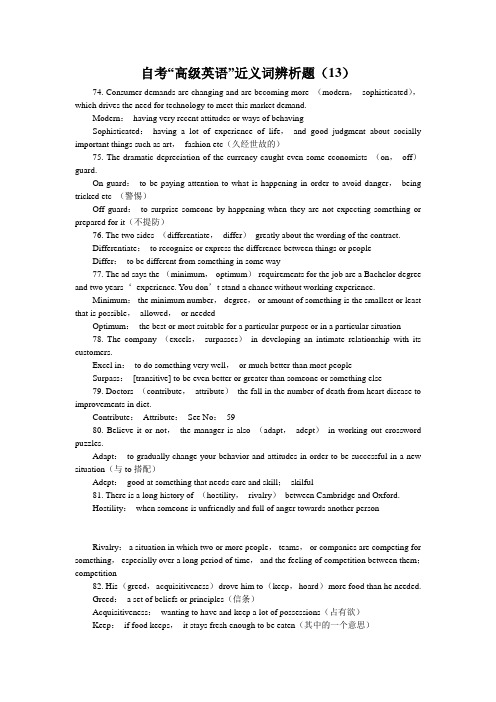
自考“高级英语”近义词辨析题(13)74. Consumer demands are changing and are becoming more (modern,sophisticated),which drives the need for technology to meet this market demand.Modern:having very recent attitudes or ways of behavingSophisticated:having a lot of experience of life,and good judgment about socially important things such as art,fashion etc(久经世故的)75. The dramatic depreciation of the currency caught even some economists (on,off)guard.On guard:to be paying attention to what is happening in order to avoid danger,being tricked etc (警惕)Off guard:to surprise someone by happening when they are not expecting something or prepared for it(不提防)76. The two sides (differentiate,differ)greatly about the wording of the contract.Differentiate:to recognize or express the difference between things or peopleDiffer:to be different from something in some way77. The ad says the (minimum,optimum)requirements for the job are a Bachelor degree and two years‘experience. You don’t stand a chance without working experience.Minimum:the minimum number,degree,or amount of something is the smallest or least that is possible,allowed,or neededOptimum:the best or most suitable for a particular purpose or in a particular situation78. The company (excels,surpasses)in developing an intimate relationship with its customers.Excel in:to do something very well,or much better than most peopleSurpass:[transitive] to be even better or greater than someone or something else79. Doctors (contribute,attribute)the fall in the number of death from heart disease to improvements in diet.Contribute:Attribute:See No:5980. Believe it or not,the manager is also (adapt,adept)in working out crossword puzzles.Adapt:to gradually change your behavior and attitudes in order to be successful in a new situation(与to搭配)Adept:good at something that needs care and skill;skilful81. There is a long history of (hostility,rivalry)between Cambridge and Oxford.Hostility:when someone is unfriendly and full of anger towards another personRivalry:a situation in which two or more people,teams,or companies are competing for something,especially over a long period of time,and the feeling of competition between them;competition82. His (greed,acquisitiveness)drove him to (keep,hoard)more food than he needed.Greed: a set of beliefs or principles(信条)Acquisitiveness:wanting to have and keep a lot of possessions(占有欲)Keep:if food keeps,it stays fresh enough to be eaten(其中的一个意思)Hoard:a collection of things that someone hides somewhere,especially so they can use them later83. On her deathbed,she told her children that she had nothing to (repent of,regret)。
高考英语中高频近义词或同义词辨析
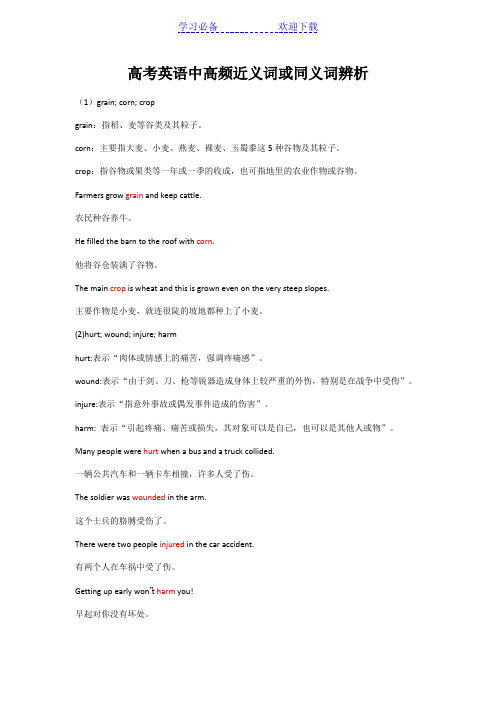
高考英语中高频近义词或同义词辨析(1)grain; corn; cropgrain:指稻、麦等谷类及其粒子。
corn:主要指大麦、小麦、燕麦、裸麦、玉蜀黍这5种谷物及其粒子。
crop:指谷物或果类等一年或一季的收成,也可指地里的农业作物或谷物。
Farmers grow grain and keep cattle.农民种谷养牛。
He filled the barn to the roof with corn.他将谷仓装满了谷物。
The main crop is wheat and this is grown even on the very steep slopes.主要作物是小麦,就连很陡的坡地都种上了小麦。
(2)hurt; wound; injure; harmhurt:表示“肉体或情感上的痛苦,强调疼痛感”。
wound:表示“由于剑、刀、枪等锐器造成身体上较严重的外伤,特别是在战争中受伤”。
injure:表示“指意外事故或偶发事件造成的伤害”。
harm: 表示“引起疼痛、痛苦或损失,其对象可以是自己,也可以是其他人或物”。
Many people were hurt when a bus and a truck collided.一辆公共汽车和一辆卡车相撞,许多人受了伤。
The soldier was wounded in the arm.这个士兵的胳膊受伤了。
There were two people injured in the car accident.有两个人在车祸中受了伤。
Getting up early won‟t harm you!早起对你没有坏处。
(3)affair; thing; matter; businessaffair:意为“事情、事件”, 含义较广,泛指已做或待做的事。
复数affairs一般指商业事务及政府的日常事务,如财政管理、外交事务等。
thing:意为“事情、事物”,不管大事小事、好事坏事均称为thing,一般不能专指事务。
高级英语近义词辨析题 下册

下册(共128题)1. It took him three years to pay off all the debts (occurred,incurred) by buying that new house.Occur:to happenIncur:if you incur a cost,debt,or a fine,you have to pay money because of something you have done,or you do not make money2. The boy gave an (ingenuous,ingenious) account of what had happened,concealing nothing.Ingenuous:an ingenuous person is simple,trusting,and honest,especially because they have not had much experience of lifeIngenious:someone who is ingenious is very good at inventing things or at thinking of new ideas3. He gave such (implicit,explicit) instructions that everyone understood them.Implicit:suggested or understood without being stated directlyExplicit:expressed in a way that is very clear and direct4. The two brothers (compliment,complement) each other; one is impulsive,the other,cautious.Compliment:to say something nice to someone in order to praise them Complement:to make a good combination with someone or somethingelse(相辅相成,结合得很好)5. The little boy (stimulated,simulated) illness not to go to school. Stimulate:to encourage or help an activity to begin or develop further Simulate:to make or produce something that is not real but has the appearance or feeling of being real6. Sitting alone in his room,he (wondered,brooded) over his failure to get a job after a whole year of trying.Wonder:to think about something that you are not sure about and try to guess what is true,what will happen etcBrood:to keep thinking about something that you are worried or upset about 7. She has had a (grudge,malice) against me ever since I turned down her unreasonable request.Grudge:a feeling of dislike for someone because you cannot forget that they harmed you in the pastMalice:the desire to harm someone because you hate them8. After graduating from the business school,he went to work in a big corporation and proved to be quite a (shrewd,cunning) businessman. Shrewd:good at judging what people or situations are really likeCunning:someone who is cunning is clever and good at deceiving people in order to get what they want9. (Invariably,Unchangeably) strict with himself,he went over the accounts yet another time.Invariably:if something invariably happens or is invariably true,it always happens or is trueUnchangeably:not likely to change,or changing often10. Many people are worried by what they think is (unaccustomed,undesirable) scenes on TV for the children.Unaccustomed:not used to somethingUndesirable:something or someone that is undesirable is not welcome or wanted because they may affect aSituation or person in a bad way11. It is impossible to sort out all the (squabbles,debates) among the children. Sometimes one just has to ignore them.Squabbles:to argue about something unimportantDebates:to discuss a subject formally when you are trying to make a decision or find a solution12. It is such a (pitiful,sympathetic) sight to see the elderly people sitting on park benches,lonely and expressionless.Pitiful:someone who is pitiful looks or sounds so sad and unfortunate that you feel very sorry for them(直接修饰人)Sympathetic:caring and feeling sorry about someone's problems(可跟人或物或动作)13. The party over,the guests gone,she looked at the empty rooms and sank into (anguish,melancholy)。
高中英语近义词组辨析
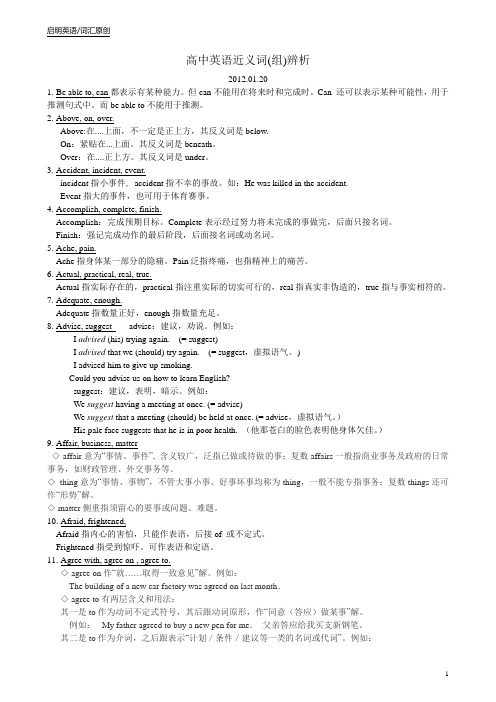
高中英语近义词(组)辨析2012.01.201.Be able to, can都表示有某种能力。
但can不能用在将来时和完成时。
Can 还可以表示某种可能性,用于推测句式中。
而be able to不能用于推测。
2.Above, on, over.Above:在....上面,不一定是正上方,其反义词是below.On:紧贴在...上面。
其反义词是beneath。
Over:在....正上方。
其反义词是under。
3.Accident, incident, event.incident指小事件, accident指不幸的事故。
如:He was killed in the accident.Event指大的事件,也可用于体育赛事。
4.Accomplish, complete, finish.Accomplish:完成预期目标。
Complete表示经过努力将未完成的事做完,后面只接名词。
Finish:强记完成动作的最后阶段,后面接名词或动名词。
5.Ache, pain.Ache指身体某一部分的隐痛。
Pain泛指疼痛,也指精神上的痛苦。
6.Actual, practical, real, true.Actual指实际存在的,practical指注重实际的切实可行的,real指真实非伪造的,true指与事实相符的。
7.Adequate, enough.Adequate指数量正好,enough指数量充足。
8.Advise, suggest advise:建议,劝说。
例如:I advised (his) trying again. (= suggest)I advised that we (should) try again. (= suggest,虚拟语气。
)I advised him to give up smoking.Could you advise us on how to learn English?suggest:建议,表明,暗示。
英语近义词辨析(高频)
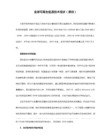
proclaim v. 宣布;宣告(成立)。指经过深思熟虑后向大众宣布一个明确的决定或判断,尤其指重大事件的宣布,多用于官方场合。
举例:The president proclaimed an emergency when the war came.
翻译:他向法官供认了他的罪行。
concede v. 指曾想隐瞒或不愿意承认某一错误,但由于证据确凿而不得不勉强承认,还可以指以退为进的承认。
举例:The man who caused the accident finally conceded to the police that he had done it.
翻译:他粗声大气,脾气暴躁;朋友们告诉他要改变自己的举止。
8.transform v. 指彻底、深远的改变,这种变化完全改变了外观或特性,使被改变的对象脱胎换骨。
举例:Remodeling transformed an old, dark housesintosa cheerful one.
admit v. 指由于说服、再三追问而承认某一事实或过错
举例:I admit that you have a point.
翻译:我承认你有理。
confess v. 供认(罪行、过错等),含有坦白、招认的意思
举例:He confessed his crimes to the judge.
举例:The crowd linked arms to form a barrier.
翻译:群众臂挽着臂组成人墙。
attach v. 将某物系在、贴在、附在另一物上
举例:I attached a note to my report with a paper clip.
高级英语第二册近义词辨析

Lesson 21.wail: to say something in a loud, sad, and complaining way 大声哭叫,嚎啕大哭例:The child wailed with pain.cry: to produce tears from your eyes, usually because you are unhappy or hurt 哭,哭泣,流泪例:She cried every time she sees the movie.weep: (formal or literary) to cry, especially because you feel very sad(因悲伤而)哭泣,流泪例:She wept bitterly when her pet died.sob: to cry noisily while breathing in short, sudden bursts 啜泣,呜咽,抽噎例:A little boy was sobbing in the corner of the room.whimper: to make low crying sounds, or to speak in this way 呜咽,啜泣,抽噎地说例:”Okay,” he managed to whimper.moan: to make long low sound expressing pain, unhappiness, etc. 呻吟,呜咽例:The patient moaned all right.2.frenzy: a state of uncontrolled excitement or emotion 狂乱,疯狂,狂热例:They fell into a frenzy of helpless alarm at the news.mania: a very strong desire for something or interest in something, especially one that affects a lot of people at the same time 狂热,热衷,癖好例:The whole country is in the grip of football mania.delirium: extreme excitement 狂喜,极度兴奋hysteria: extreme excitement that makes people cry, laugh, shout, etc. uncontrollably 歇斯底里例:News of the victory produced mass hysteria.3.glisten: to shine and look wet or oily (潮湿或油亮之物) 闪光,闪耀例:His brows glistened with sweat.glitter: to shine brightly with flashing points of light 闪烁,闪光例:Her ring glitters with a big diamond.flash: to shine suddenly and brightly for a short time, or to make something shine in this way (使)闪光(闪亮)例:Why is that guy flashing his headlights at me?shimmer: to shine with a soft light that looks as if it shakes slightly 发微光,闪闪发亮例:The lake shimmered in the moonlight.sparkle: to shine in small bright flashes 闪闪发光,闪耀,闪烁例:The diamond sparkled.Lesson 31.ignorant: not knowing facts or information that you ought to know 无知的,没有学识的,愚昧的例:I’m ignorant about politics.illiterate: someone who is illiterate has not learned to read or write 不识字的,文盲的例:People who have never gone to school are usually illiterate.uneducated: not educated to the usual level, or showing that someone is not well educated 没受教育的,没受良好教育的,没有教养的例:He was uneducated.unlearned: not established by conditioning or learning未受教育的,不熟练的例:Our sales director is unlearned.2.jeer: to laugh unkindly at someone to show that you strongly disapprove of them 嘲笑,嘲弄例:Of course they jeered at you—you lose the game, right?scoff: to laugh at a person or idea, and talk about them in a way that shows you think they are stupid 嘲笑,讥笑,嘲弄例:They scoffed at the idea that anything could be changed.sneer: to smile or speak in a very unkind way that show you have no respect for someone or something冷笑,讥笑,嘲笑例:He sneered at my attempt and said it was impossible to me.gibe: to say something rude or insulting which is intended to make another person look foolish 嘲笑例:”No doubt he’ll give me the chance to fight him again,” he gibed, tongue in cheek.flout: to deliberately disobey a law, rule, etc. 公然无视,违抗(法律、规定等)例:Countries that flout the agreement will have sanctions imposed on them.Lesson 41.mortal: not living for ever不会长生不死的,终有一死的例:Her father’s death reminded her that she was mortal, too.fatal: resulting in someone’s death 致命的例:The blow on his head was fatal to him.deadly: very dangerous 非常危险的例:This disease is deadly.lethal: causing death, or having the power to cause death 致命的,致死的,具有杀伤力的例:In situation like this, she wishes she had a gun or some lethal weapon.2.faithful: remaining loyal to a person, belief, political party etc. and continuing to support them (对人、信仰、政党等)忠诚的,忠实的,守信的例:He is faithful to his principles.loyal: always supporting your friends, principles, country, etc. (对…)忠贞的,忠实的,忠诚的例:He wanted to be loyal to his family.constant: literary loyal and faithful 忠实的,忠诚的例:Mary is one of my constant friends.staunch: giving strong, loyal support to another person, organization, belief etc. 坚定的,忠实可靠的例:They are staunch trade unionists.resolute: doing something in a very determined way because you have very strong beliefs, aims, etc. 坚定的,坚决的例:She resolutely resisted his amorous advances.Lesson 51.Fashion is the prevalent custom in dress, manners, speech, etc. of a particular place or time, especiallyas established by the dominant section of society or the leaders in the fields of art, literature, etc. Fad emphasizes the impulsive enthusiasm with which a fashion is taken up for a short time.2.Incredulous expresses a person’s unwillingness or inability to believe. Incredible usually describessomething that is too unusual or improbable to be possible, something is inconceivable.3.Passion usually implies a strong emotion that has an overpowering or compelling influence connotingparticularly sexual love or intense anger. Eagerness shows great enthusiasm, zeal, or sometimes impatience in the desire for or pursuit of something.4.Feeling,when unqualified in the context, refers to any of the subjective reactions, enjoyable orunenjoyable, that one may have in a situation and usually connotes an absence of reasoning. Emotion implies a strong feeling with physical as well as mental manifestations.5.Reveal implies a making known of something hidden or secret, as if by drawing back a veil. Showimplies putting or bringing something into sight so that it can be seen or looked at.6.Tempt expresses the influence of a powerful attraction that intends to overcome scruples or judgment.Incline refers to a more or less vague mental temperament toward some action, practice or thing.7.Exasperate implies intense irritation that exhausts one’s patience or makes one lose one’s self-control.Disappoint shows the failure to satisfy one’s hopes or expectations.8.Indulge implies a yielding to the wishes or desires of oneself or another because of a weak will or anamiable nature. Tolerate implies self-imposed restrain of one’s resistance to what if offensive or repugnant.9.Amuse shows the agreeable occupation of the mind, especially by something that appeals to the s enseof humor. Merry shows something that is full of fun and laughter.nguish means to suffer with longing. Suffer means to undergo something that is painful orunpleasurable, as injury, grief, a loss, etc.1.keen: a keen sense of smell or keen sight or hearing is an extremely good ability to smell, see, hear, etc.灵敏的,敏锐的例:Dogs have a very keen sense of smell.calculating: making careful and clever plans to get what you want, without caring about anyone else 有打算的,工于心计的,用尽心机(做利己损人之事)的例:The criminal had a cold, calculating mind.perspicacious: good at judging and understanding people and situations 明察是非的,敏锐的,有洞察力的例:It is very perspicacious of you to find the cause of the trouble so quickly.astute: able to understand situations or behavior very well and very quickly, especially so that you can get an advantage for yourself 精明的,敏锐的,狡黠的例:It is an astute move to sell just before price goes down.2.intelligent: having a high level of mental ability so that you are good at understanding ideas andthinking quickly andclearly 有智慧的,聪明的,悟性强的例:Dolphin is an intelligent animal.bright: intelligent and likely to be successful 聪颖的例:He is very bright.brilliant: extremely good, clever, or skillful 辉煌的,聪颖的,才华横溢的例:She is brilliant but her work lacks organization.clever: able to learn and understand things quickly 才思敏捷的,聪明的例:How clever he is.smart: intelligent 聪颖的,精明的,机灵的例:The new employee was smart and quick to learn.Lesson 71.dirt: any substance that makes things dirty, such as mud or dust 尘土,灰尘,烂泥,污物例:He washed the dirt off his car.filth: an extremely dirty substance 污物,污秽例:Go and wash that filth off your hands@soot: black powder that is produced when something is burnt煤烟(灰)例:There was a lot of soot up the chimney.grime: dirt that forms a black layer on surfaces (表面的)尘垢,污垢例:His face and hands were covered with grime from the coal dust.2.libido: someone’s desire to have something 欲望passion: a very strong, deeply felt emotion, especially of sexual love, of anger, or a belief in an idea or principle强烈的情感,激情(尤指性爱、愤怒或对某种思想、原则的信念)例:He spoke with passion.love: to have a strong feeling of caring for and liking someone, combined with sexual attraction 爱情,恋爱,性爱例:He was the only man she had ever loved.lust: a very strong desire to have something, usually power or money 强烈的欲望(通常指对权力或金钱的欲望)例:His lust for power will never be satisfied.Lesson 12plex refers to that which is composed of many elaborately interrelated or interconnected parts, sothat much study or knowledge is needed to understand or make use of it (a complex mechanism);complicated is applied to that which is highly complex and hence ve ry difficult to analyze, solve, or understand (a complicated problem).2.Delusion implies belief in something that is contrary to fact or reality, resulting from a deception, amisconception, or a mental disorder (to have delusion of grandeur);illusion suggests the false perception or interpretation of something external (perspective in drawing gives the illusion of depth).3.Intellectual suggests keen intelligence with interest and ability in the more advanced fields ofknowledge (the intellectual pursuits of scholars); intelligent implies the ability to learn or understand from experience or to react successfully to a new experience (an intelligent boy); clever implies quickness in learning our standing; but sometimes denotes a lack of thoroughness or depth (a clever dog).4.Probable is used to that which appears reasonable on the basis of evidence or logic but is neithercertain nor proved (the probable cause of the disease);possible applies to that which although not probable, may conceivably exist, occur, be done etc. (a possible solution to the problem); likely suggests greater probability than possible, but less credibility than probable (it is likely to rain).Lesson 141.assert: to state firmly that something is true (坚决)主张,断言例:She asserted his innocence,declare: to state officially and publicly that a particular situation exists or that something is true 宣布,表明例:The doctor finally declared that the man was dead.affirm: to state publicly that something is true 断言,申明,确认例:The general affirmed rumors of an attack.2.fragile: not strong and therefore easily broken or damaged 脆弱的,易碎的,易损坏的例:This glass dish looks very fragile.brittle: hard but easily broken 脆的,易碎的例:The branches were very dry and brittle.3.mix: if you mix two or more substances or if they mix, they combine to become a singlesubstance, and they cannot be easily separated (使)混合,搅合例:She mixed flour and milk together.mingle: if two feelings, sounds, smell, etc. mingle, they combine with each other but can stillbe recognizedseparately (使)混合例:The smell of sweat and stale cigar smoke mingled together.merge: to combine or join together to form one thing 融合;合并例:The company plans to merge its subsidiaries in the US.mon: existing in large numbers or happening often and in many places 大量的,常见的,多发的例:Heart disease is one of the commonest causes of death.general: of an ordinary kind, not one particular kind 普通的例:I spend about ten hours a week doing general cooking and cleaning.popular: liked by a lot of people 受大众喜爱的,受欢迎的例:Hilary was popular at school.。
50个英语高级词汇,包含单词解析,同义词辨析和例句
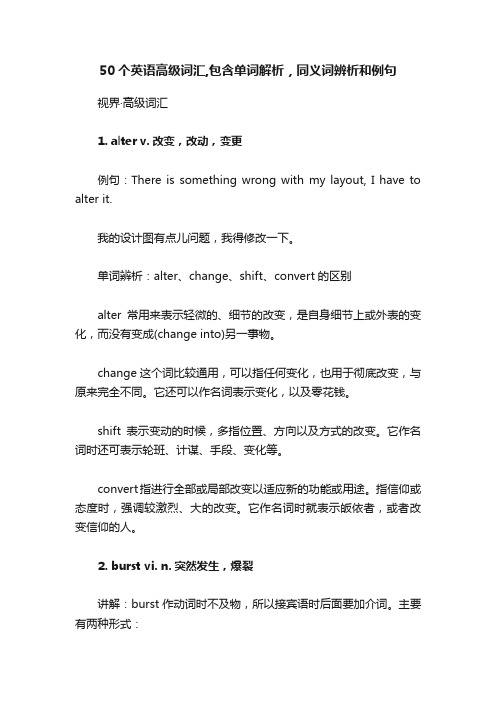
50个英语高级词汇,包含单词解析,同义词辨析和例句视界·高级词汇1. alter v. 改变,改动,变更例句:There is something wrong with my layout, I have to alter it.我的设计图有点儿问题,我得修改一下。
单词辨析:alter、change、shift、convert的区别alter常用来表示轻微的、细节的改变,是自身细节上或外表的变化,而没有变成(change into)另一事物。
change这个词比较通用,可以指任何变化,也用于彻底改变,与原来完全不同。
它还可以作名词表示变化,以及零花钱。
shift表示变动的时候,多指位置、方向以及方式的改变。
它作名词时还可表示轮班、计谋、手段、变化等。
convert指进行全部或局部改变以适应新的功能或用途。
指信仰或态度时,强调较激烈、大的改变。
它作名词时就表示皈依者,或者改变信仰的人。
2. burst vi. n. 突然发生,爆裂讲解:burst作动词时不及物,所以接宾语时后面要加介词。
主要有两种形式:burst into+n. / burst out+doing例句:Because of the sad news, she burst into tears. /she burst out crying.因为这个令人难过的消息,她大哭起来。
3. dispose vi. 除掉;处置;解决;处理(of)讲解:dispose作为不及物动词,其后接宾语时要加介词of。
例句:Mum ordered me to dispose of these unfashionable clothes.老妈命令我把这些过时的衣服处理掉。
4. blast n. 爆炸;气流 vi. 炸,炸掉讲解:blast作动词表示爆炸同explode,也可表示严厉批评(criticize),名词形式跟动词一致,相对应的近义词是explosion,criticism。
高考英语常见近义词辨析整理
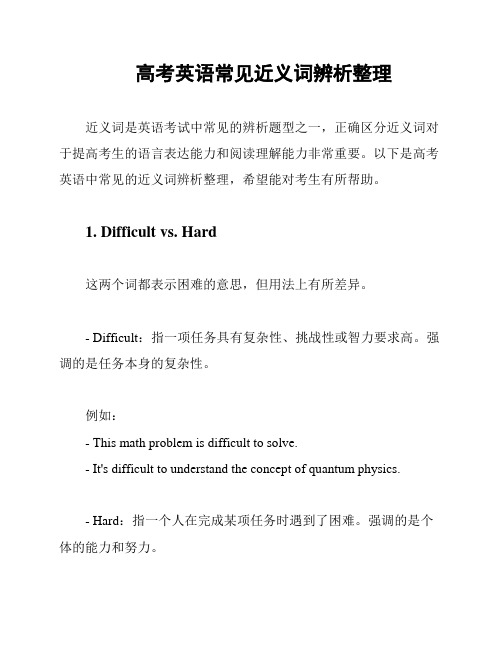
高考英语常见近义词辨析整理近义词是英语考试中常见的辨析题型之一,正确区分近义词对于提高考生的语言表达能力和阅读理解能力非常重要。
以下是高考英语中常见的近义词辨析整理,希望能对考生有所帮助。
1. Difficult vs. Hard这两个词都表示困难的意思,但用法上有所差异。
- Difficult:指一项任务具有复杂性、挑战性或智力要求高。
强调的是任务本身的复杂性。
例如:- This math problem is difficult to solve.- It's difficult to understand the concept of quantum physics.- Hard:指一个人在完成某项任务时遇到了困难。
强调的是个体的能力和努力。
例如:- I found the math problem hard to solve.- He worked hard to understand the concept of quantum physics.2. Accept vs. Except这两个词往往容易混淆,但意思截然不同。
- Accept:表示接受或同意。
例如:- I accept your apology.- The university accepted her application.- Except:表示除了、排除。
例如:- Everyone is here except John.- I like all fruits except for bananas.3. Advise vs. Advice这两个词都与建议有关,但用法有所不同。
- Advise:动词形式,表示提供建议或告诉某人该做什么。
例如:- I advise you to study harder for the exam.- The doctor advised her to get more exercise.- Advice:名词形式,表示建议或忠告。
高考词汇——66组近义词辨析

高考词汇——66组近义词辨析1.hit: 敲击一下strike: 一下或若干下beat: 有节奏的,连续的敲击;打败1) My heart beats much faster when I saw her.2) Some monks in the temple are in charge of striking the hour.3) A good idea strikes my mind all at once4)The rain beat against the window.2.accident: (交通)事故event: 大事件incident: 小事件;(政治上)事变1)He broke his leg in a car accident.2)What he said is only an ordinary incident.3)Xi’an event happened on December 12, 1936.4)The program reviews the most important event of this year.co~该词缀表示共同、共有:coincident 巧合;co-worker 同事co-operate 合作;co-exist 共存3.across: 平面的穿越(穿过沙漠)over: 上面through: 三维空间(穿过森林)1)She went across the street to make some purchases.2)The train passed over the bridge.3)Can you see the sky through the hole?4)The Xiang River flows through Changsha. (河床是内陷的)4.brain:大脑,头脑(智慧)mind:思想heart:心思,注意力head:固定用法1)Boris has brain. In fact I doubt no one has a higher IQ than his.2)Nothing is difficult if you put your heart into it. 世上无难事,只怕有心人。
高中阶段英语近义词辨析

高中阶段英语近义词辨析Kind, Sort, Species, Type, CategoryKind(n.)---“种类”。
指同种类的东西。
Sort(n.)---“种类”。
指大体相似的东西, 有时用于贬义判断。
Species(n.)---“种类”。
指相同种类的生物。
Type(n.)---“种类”。
指不太明确类别的划分,有主观判断之意。
Category(n.)---“种类”。
正式用语。
指对材料或图书等进行分析而划分的种类。
例:This is the best kind of pen.这是最好的一种钢笔。
I can feel at home in this kind of room.在这样的房间里我感到象在家里一样。
What sort of food do you like best?你最喜欢吃什么食物?I will make no attempt of the sort.我不愿做这种事。
This is an extinct species of fish.这是一种已经灭绝的鱼。
Blackmail is a species of crime which we all hate.恫吓勒索是我们大家憎恨的一种罪行。
The horticulturist developed a new type of rose.园艺师培育了玫瑰的一个新品种。
Her beauty is of the Italian type.她的美是意大利型的。
Put it there, it belongs to that category.把它放在那儿,它属于那一类。
Place these books in categories, please.请把这些书分门别类地进行整理。
Kill, Assassinate, Execute, Dispatch, Murder, Slay, SlaughterKill(v.)---“杀”,“杀死”。
普通用语。
高级英语近义词辨析题汇总(有答案和讲解)

高级英语近义词辨析题汇总(有答案和讲解)高级英语近义词辨析题汇总上册(共128题)1. The whole nation watched the two candidates (arguing, debating) the issue of raising taxes on TV.Argue: (transitive) to state, giving clear reasons, that something is true, should be done etc Debate: (transitive) to discuss a subject formally when you are trying to make a decision or find a solution2. It was a (proud, arrogant) moment for my cousin when she shook hands with the President. Proud: feeling pleased about something that you have done or something that you own, or about someone or something you are involved with or related to Arrogant: behaving in an unpleasant or rude way because you think you are more important than other people3. Even if you (mix, blend) oil and water, they will not (mix, blend).Mix: if you mix two or more substances or if they mix, they combine to become a single substance, and they cannot be easily separatedBlend: to combine different things in a way that produces an effective or pleasant result, or to become combined in this way4. Some people watch television so much that they cannot (conceive, imagine) of living without it. Conceive: (formal) to imagine a particular situation or to think about something in a particular wayImagine; to form a picture or idea in your mind about what something could be like5. As it was an informal dinner, most people (wore, weredressed) in their comfortable clothes. Wear: [transitive] to have something such as clothes, shoes, or jewellery on your body Dress: to put clothes on yourself or someone else (一般跟IN 搭配)6. Do you think those young people are (idealistic, ideal) or pragmatic?Idealistic: believing that you should live according to high standards and principles, even if they cannot really be achieved, or showing this beliefIdeal: the best or most suitable that something could possibly be7. Filled with great (adulation, admiration) for their integrity and courage, he was determined to bea man like them.Adulation: praise and admiration for someone that is more than they really deserve Admiration: a feeling of great respect and liking for something or someone8. Deep at night, they could still hear gun-fire (rambling, rumbling) in the distance.Ramble: to talk for a long time in a way that does not seem clearly organized, so that other people find it difficult to understand you(漫谈); To go on a walk in the countryside for pleasure Rumble: to make a series of long low sounds, especiallya long distance away from you9. The professor looked over our papers with a hasty (sight, glance).Sight: the act of seeing somethingGlance: to quickly look at someone or something10. Before ordering their dinner, they considered the (relevant, relative) merits of chicken and roast beef.Relevant: directly relating to the subject or problem being discussed or considered(强调与一方相关)Relative: having a particular quality when compared with something else(强调比较)11. the little boy’s constant noise (exhilarated, exasperated) his father, who was busy writing a paper for a symposium(座谈会).Exhilarate: to make someone feel very excited and happyExasperate: to make someone very annoyed by continuing to do something that upsets them12. isn’t it (wholesome, noisome) to live in a city with so many vehicles passing day and night? Wholesome: likely to make you healthyNoisome: very unpleasant13. He was born in a small town (lived, inhabited) by about 500 people.Live: if you live in a place, you have your home thereInhabit: if animals or people inhabit an area or place, they live there14. Her desk was all (jumbled, cluttered) with old papers, strings, and other odds and ends. Jumble: to mix things together in an untidy way, without any order(及物动词经常用于被动,不能作表语)Clutter: to cover or fill a space or room with too many things, so that it looks very untidy(与with 搭配)odds and ends: small things of various kinds without much value(零星东西)15. He thinks they are extremely (idealistic, ideal), for all their pragmatism.Idealistic, ideal: see number 616. She made one last (attraction, appeal) to her father forpermission to go to the party. Attraction: a feeling of liking someone, especially in a sexual way(强调双方相互吸引) Appeal: a quality that makes people like something or someone(强调一方吸引另一方)17. The girl looked at the doctor (terrifyingly, terrified). PS:形容人ED,形容事/物ING. Terrifyingly: extremely frightening; scary(表主动)Terrified: very frightened; scared(表被动)18. “If you finish all the homework tonight, we’ll go for a picnic tomorrow,” he (admonished, coaxed).Admonish: (formal) to tell someone severely that they have done something wrongCoax: to persuade someone to do something that they do not want to do by talking to them in a kind, gentle, and patient way19. He thought their behavior was (contemptuous, contemptible), but he didn’t say anything in front of the host.Contemptuous: showing that you think someone or something deserves no respect Contemptible: not deserving any respect at all20. Summoned by the boss, he approached his office full of (apprehension, distrust). Apprehension: anxiety about the future, especially about dealing with something unpleasant or difficult; anxietyDistrust: a feeling that you cannot trust someone21. He was sincerely sorry for what happened at the party, so people accepted his (excuse, apology).Excuse: a reason that you give to explain careless or offensive behavior; a reason that you invent to explain an action and to hide your real intentionsApology: something that you say or write to show that you are sorry for doing something wrong22. They were walking in the forest when they heard a (terrifying, terrific) roar, which made their blood freeze.Terrifying: extremely frighteningTerrific: (informal) very good, especially in a way that makes you feel happy and excited;very large in size or degree(在尺寸和程度上很大)23. Obviously they were getting nowhere with the meeting, so he decided to (desist, resist) from making a final decision that afternoon.Desist: (formal) to stop doing something (跟from搭配)Resist: to stop yourself from having something that you like very much or doing something that you want to do(后面直接加动名词)24. “How can you say that you don’t want to see your grandmother” the fat her (admonished, coaxed).Admonish, coax: see number 1825. The warrior managed to (evade, dodge) the arrow that came flying through the air.Evade: to avoid talking about something, especially because you are trying to hide something(避而不谈); to escape from someone who is trying to catch you(逃避)Dodge: to move quickly to avoid someone or something26. They speaker’s last few words wer e (drowned out, stopped) by the audience’s thunderous applauses.Drown out: if a loud noise drowns out another sound, it prevents it from being heardStop: prevent, not continue27. Would I be (intruding, invading) if I joined in yourdiscussion?Intrude: to interrupt someone or become involved in his or her private affairs in an annoying and unwanted way Invade: to enter a country, town, or area using military force, in order to take control of it28. The (omission, exclusion) of a full stop at the end of the sentence is a deliberate act by the writer.Omission: when you do not include or do not do something Exclusion: when someone is not allowed to take part in something or enter a place29. The newly-recruited soldiers swore an (oath, promise) of loyalty to their countryOath: a formal and very serious promisePromise: to tell someone that you will definitely do or provide something or that something will happen30. The suspect was accused of (preventing, withholding) some important evidence from the court.Prevent: to stop something from happening, or stop someone from doing somethingWithhold: to refuse to give someone something(隐瞒)31. Whether or not he is the best person for the promotion is (debatable, arguable). Debatable: things that are debatable are not certain because people have different opinions about them Arguable: not certain, or not definitely true or correct, and therefore easy to doubt32. He has established himself as a (credible, believable) businessman.Credible: deserving or able to be believed or trusted(可形容人或事)Believable: something that is believable can be believedbecause it seems possible, likely, or real(只能形容事)33. His story of having discovered the treasure buried by some pirates seemed (incredible, incredulous) to everyone Incredible: too strange to be believed or very difficult to believeIncredulous: unable or unwilling to believe something34. “But the piano is out of (tone, tune)”, she said in a disappointed (tone, tune).Tone: the way your voice sounds, which shows how you are feeling or what you meanTune: a series of musical notes that are played or sung and are nice to listen to35. Her friends expressed great (sympathy, empathy) to her when her mother died.Sympathy: the feeling of being sorry for someone who is in a bad situation(表具体)Empathy: the ability to understand other people's feelings and problems(表抽象)36. They are now enjoying a short (vocation, vacation) at the seashore.V ocation: the feeling that the purpose of your life is to do a particular type of work, especially because it allows you to help other people(尤指一种能够帮助他人的职业,比如说教师等) V acation: a holiday, or time spent not working37. A (content, contented) person is one who is happy with what he has.Content: happy and satisfied(因为别人的原因而使你感到满意) Contented: happy and satisfied because your life is good(因为自己的原因而使你感到满意)38. All the streets will be (eliminated, illuminated) tomorrowevening for the celebration. Eliminate:to completely get rid of something that is unnecessary or unwanted(有除掉敌人或淘汰比赛对手意思)Illuminate: to make a light shine on something, or to fill a place with light(原意为照亮,另有阐明的意思)39. Her (perseverance, persistence) in wearing that old-fashioned hat surprised her husband. Perseverance: determination to keep trying to achieve something in spite of difficulties(坚毅) Persistence: determination to do something even though it is difficult or other people oppose it(坚持或固执)40. The effect of the officer’s speech was such that the army recovered it’s (moral, morale) at once.Moral: relating to the principles of what is right and wrong behavior, and with the difference between good and evil(道德) Morale: the level of confidence and positive feelings that people have, especially people who work together, who belong to the same team etc(士气)41. South Africa used to be a country where black people and white people were (separated, segregated).Separate: to divide or split into different parts, if something separates two places or two things, it is between them so that they are not touching each otherSegregate: to separate one group of people from others, especially because they are of a different race, sex, or religion(尤指种族隔离)42. The letter from her sister so (embittered, agitated) her that she stayed awake half the night, trying to think of a way to get back at her.Embitter: angry, sad, or full of hate because of bad or unfair things that have happened to you Agitate: (formal) to makesomeone feel anxious, upset, and nervous(使不安,另有煽动的意思) Get back at sb.: to do something to hurt or harm someone who has hurt or harmed you43. Y ou haven’t seen him for over a year?” he sounded (incredible, incredulous).Incredible: too strange to be believed or very difficult to believe(表示一种怀疑的态度) Incredulous: unable or unwilling to believe something(表示虽然不愿相信但承认事实)44. No matter what he said, the only response he got from him was a (noncommittal, tentative) “I see”Noncommittal: deliberately not expressing your opinion or intentions clearly(不明朗的) Tentative: not definite or certain, and may be changed later(暂时,试验性的)45. That plan was too (untrue, unrealistic) to be adopted.Untrue: not based on facts that are correctUnrealistic: unrealistic ideas or hopes are not reasonable or sensible46. When people looked at him too (intently, tentatively), he felt very uncomfortable.Intently: giving careful attention to something so that you think about nothing else Tentatively: not definite or certain, and may be changed later(暂时,试验性的)47. Since she didn’t know anybody in that city, she was rather (hesitant, tentative) when accepting the job offer.Hesitant: uncertain about what to do or say because you are nervous or unwillingTentative: done without confidence(这是tentative的第二个意思)48. “Do you really think he will give up the position?” he (scoffed, scold).Scoff: to laugh at a person or idea, and talk about them in a way that shows you think they are stupid; make fun of Scold: to angrily critic ize someone, especially a child, about something they have done49. She told the children about her life on the farm all those years ago, how she (got used to, used to) get up at four every morning to milk the cows.Get used to: to have experienced something so that it no longer seems surprising, difficult, strange etcUsed to: if something used to happen, it happened regularly or all the time in the past, but does not happen now50. The teacher told the boys first to (pour, splash) some water on the floor before mopping it. Pour: to make a liquid or other substance flow out of or into a container by holding it at an angle Splash: to make someone or something wet with a lot of small drops of water or other liquid CF: sprinkle51. When he was discovered, the pick-pocket (waved, flapped) a knife to threaten the people around him.Wave: to raise your arm and move your hand from side to side in order to make someone notice youFlap: to move quickly up and down or from side to side, often making a noise52. The eagle suddenly (drifted, swooped) down and snatched the piece of meat.Drift: to move slowly on water or in the airSwoop: if a bird or aircraft swoops, it moves suddenly down through the air, especially in order toattack something53. With the help of the specially trained dogs, they were able to (rescue, save) ten people buried in the snow.Rescue: to save someone or something from a situation of danger or harm(强调营救的过程) Save: to make someone or something safe from danger, harm, or destruction(强调安全)54. His feet were numb with cold; as soon as he got into the room he started (rubbing, stroking) them vigorously.Rub: to move your hand, or something such as a cloth, backwards and forwards over a surface while pressing firmly Stroke: to move your hand gently over somethingNumb means unable to feel anything55. The kitchen floor has to be (scrubbed, scraped) every other day.Scrub: to rub something hard, especially with a stiff brush, in order to clean itScrape: to rub against a rough surface in a way that causes slight damage or injury, or to make something do this56. Every night before he went to bed, he (made a point, made a plan) of checking all the doors and windows.Made a point: to do something deliberately, even when it involves making a special effortMade a plan: plan to do something57. Students of English are required to (remember, memorize) the listed 2000 words. Remember: to have a picture or idea in your mind of people, events, places etc from the past Memorize: to learn words, music etc so that you know them perfectly58. Y ou should not be (intolerable, intolerant) of different religious beliefs.Intolerable: too difficult, bad, annoying etc for you to accept or deal with(句子主语表示动作的对象)Intolerant: not willing to accept ways of thinking and behaving that are different from your own59. He tried to (infuse, fill) the awkward situation with humor.Infuse: (formal) to fill something or someone with a particular feeling or quality(表抽象)跟with 搭配Fill: if a container or place fills, or if you fill it, enough of something goes into it to make it full(表具体)60. We have a sense of working towards a (common, ordinary) goal.Common: common aims, beliefs, ideas etc are shared by several people or groups(这是common 特有的意思表示共同的) Ordinary: average, common, or usual, not different or special61. The virus can only be transmitted through (familiar, intimate) contact.Familiar: someone or something that is familiar is well-known to you and easy to recognize Intimate: relating to sex(在本句中的意思) ;Private and friendly so that you feel comfortable62. It suddenly (happened, occurred) to him that he had worked for twelve hours without eating anything.Happen: if you happen to do something, you do it by chance Occur: if an idea or thought occurs to you, it suddenly comes into your mind63. The students waited in (respectable, respectful) silence for the Noble Prize winner to make his speech.Respectable: someone who is respectable behaves in a way that is considered socially acceptable Respectful: feeling or showing respect64. The children suffer most when their parents (divide, separate).Divide: if something divides, or if you divide it, it separates into two or more partsSeparate: if two people who are married or have been livingtogether separate, they start to live apart65. The teacher (allotted, divided) the children into several small groups for the trip to the Palace Museum.Allot: to use a particular amount of time for something, or give a particular share of money, space etc to someone or somethingDivide: if something divides, or if you divide it, it separates into two or more parts66. Around mid-night, she received a (mysterious, miraculous) phone call from someone she did not know of.Mysterious: mysterious events or situations are difficult to explain or understandMiraculous: very good, completely unexpected, and often very lucky67. Do you think soil samples are (obtainable, absorbable) from the Mars by an unmanned aircraft in the near future?Obtainable: able to be obtainedAbsorbable:可吸收的,容易吸收的68. She was so dear to him that he still kept her picture in a (preeminent, prominent) position on his desk.Preeminent:优秀超群的Prominent: something that is in a prominent place is easily seen69. Soft background music will (enhance, increase) a delicious meal.Enhance: to improve somethingIncrease: if you increase something, or if it increases, it becomes bigger in amount, number, or degree70. He was so disappointed when the manager said that his plan was completely (dismissible, disposable).Dismissible: not deserving to be consideredDisposable: intended to be used once or for a short time and then thrown(一次性) available to be used(可再生的)71. The baby-sitter kept the kids (accompanied, company) until we got back from the theater. Accompany: to go somewhere with someoneCompany:固定搭配keep…company= be with her so that she doesn't feel lonely与谁做伴72. Will the financial (reverse, adverse) prevent you from taking a holiday this summer? Reverse: the exact opposite of what has just been mentionedAdverse: not good or favorable73. The (distribution, allotment) of funds to these universities is decided by the Ministry of Education.Distribution: the act of sharing things among a large group of people in a planned way(普通的分配)Allotment: an amount or share of something such as money or time that is given to someone or something, or the process of doing this(尤指上下级之间的分配)74. The employees are openly (contemptuous, contemptible) of their corrupt manager. Contemptuous, Contemptible: see number 1975. The gardener was asked to cut the bushes (even, equal) with the fence.Even: flat and level, with no parts that are higher than other parts (作形容词表示与持平的) Equal: the same in size, number, amount, value etc as something else76. His handwriting was so tiny that it was hardly (readable, legible).Readable: interesting and enjoyable to read, and easy tounderstand(因有趣味而可读的) Legible: written or printed clearly enough for you to read(因书写印刷清晰而可读的)77. The (shameful, shameless) family secret was brought to light.Shameful: shameful behavior or actions are so bad that someone should feel ashamed(形容行动或事件)Shameless: not seeming to be ashamed of your bad behavior although other people think you should be ashamed(只能形容人)78. The bus came to a (quick, abrupt) stop, and some passengers lost their balance.Quick: lasting for or taking only a short timeAbrupt: sudden and unexpected79. Mary aired her (grievances, grief) at not being treated fairly by the salesperson. Grievances: a belief that you have been treated unfairly, or an unfair situation or event that affects and upsets you(委屈,冤情)Grief: extreme sadness, especially because someone you love has died80. He felt (daunted, discouraged) by the enormous difficulties involved in completing the construction of the airport in one year.Daunt: to make someone feel afraid or less confident about somethingDiscouraged: no longer having the confidence you need to continue doing something81. There is a (contrariness, contradiction) between what he says and what he does. Contrariness: someone who is contrary deliberately does different things from other people (contrary特有的意思)Contradiction: a difference between two statements, beliefs,or ideas about something that means they cannot both be true82. It was in the (dark, dim) light of the early dawn that I sawa man moving towards me.Dark: if it is dark, there is little or no lightDim: fairly dark or not giving much light, so that you cannot see well83. The poor, sick man is (abused, tormented) by the policeman’s endless interrogation.Abuse: to treat someone in a cruel and violent way, often sexually(虐待尤指性方面的); to deliberately use something for the wrong purpose or for your own advantage(滥用)Torment: to make someone suffer a lot, especially mentally Interrogate: to ask someone a lot of questions for a long time in order to get information, sometimes using threats84. Too much food (induces, tempts) sleepiness.Induce: (formal) to persuade someone to do something, especially something that does not seem wise; formal to cause a particular physical condition(这是本句的意思)Tempt: to try to persuade someone to do something by making it seem attractive;85. He (wondered, mediated) for a whole week before making that important decision. Wonder: to think about something that you are not sure about and try to guess what is true, what will happen etcMediate: to try to end a quarrel between two people, groups, countries etc(在本句中表示思量考虑)86. A (n) (literal, exact) translation is not always the best.Literal translation: a translation that translates each word exactly instead of giving the general meaning in a more natural wayExact: completely correct in every detail87. The author declares that the plot and characters of the novel are (imaginary, imaginative). Imaginary: not real, but produced from pictures or ideas in your mind(虚拟的,虚构的) Imaginative: containing new and interesting ideas or good at thinking of new and interestingideas(富于想象的,爱想象的)CF imaginable: used to emphasize that something includes every possible example of something(可以想象到的)88. We walked for miles along the (twisted, crooked) path in the forest.Twisted: something twisted has been bent in many directions or turned many times, so that it has lost its original shape Crooked: bent, twisted, or not in a straight line89. We advise girls below twenty not to marry, because they are still emotionally (naive, immature).Naive: not having much experience of how complicated life is, so that you trust people too much and believe that good things will always happenImmature: someone who is immature behaves or thinks in a way that is typical of someone much younger - used to show disapproval90. Her feelings (fluctuated, changed) between excitement and fear.Fluctuate: if a price or amount fluctuates, it keeps changing and becoming higher and lower(与WITH搭配)Change: to become different, or to make something become different91. The police will not hesitate to use (force, compulsion) if they bank robbers still refuse to surrender.Force: violent physical action used to get what you wantCompulsion: a strong and unreasonable desire to do something92. After twenty years of antagonism, the two countries were finally (reconciled, friendly). Reconcile: if you reconcile two ideas, situations, or facts, you find a way in which they can both be true or acceptable(和解)Friendly: behaving towards someone in a way that shows you like them and are ready to talk to them or help them93. To call the air strikes against Y ugoslavia peace-keeping is a (downright, thorough) lie. Downright: used to emphasize that something is completely bad or untrueThorough: including every possible detail94. “As red as blood” is a (metaphor, simile)Metaphor: a way of describing something by referring to it as something different and suggesting that it has similar qualities to that thing(隐喻)Simile: an expression that describes something by comparing it with something else, using the words 'as' or 'like', for example 'as white as snow(明喻)95. The sight of the snake gave me the (trembling, shivers).Trembling: shaking slightly in a way that you cannot control, especially because you are upset orfrightenedShiver: give sb. The shivers=informal to make you feel afraid(固定搭配,除此以外trembling和shiver同义词)96. Although the children found the fables most (readable, understandable), they sometimes missed the messages of the stories.Readable:见No.76Understandable: seem normal and reasonable because of the situation you are in97. The office buildings with their (desirable, desired) locations are very much in demand. Desirable: something that is desirable is worth having or doing(正式用法)Desired: to want to have sex with someone(文学上特指这个意思)98. Driving after drinking Whiskey (is about, is apt) to cause traffic accidents.Be about to: if someone is about to do something, or if something is about to happen, they will do it or it will happen very soonBe apt to: to have a natural tendency to do something99. I don’t want the (actual, literal) meaning of the word, I’m asking y ou its figurative sense here. Actual: used to emphasize that something is real or exact(强调确切的,事实的); used to introduce the most important part of an event or activity(强调实质上的)Literal: the literal meaning of a word or expression is its basic or original meaning100. In that part of the world the summer weather is so (varied, variable) that even when the sun is shining brightly you never can be sure if it is going to rain in an hour’s time.V aried: consisting of or including many different kinds of things or people, especially in a way that seems interesting V ariable: likely to change often101. He said he would go to the dress rehearsal, (unless, provided) he was not too busy. Unless: used to say that something will happen or be true if something else does not happen or is not trueProvided that: used to say that something will only be possible if something else happens or is done102. Something has been wrong with their marriage for a long time, although she makes (pretenses, excuse) that it is not.Pretense: a way of behaving which is intended to make people believe something that are not true Excuse: to be or give a good reason for someone's careless or offensive behavior两者的区别在于:前者表示事实上是错的,而在主观上去让别人相信是对的,后者表示对于自己所作所为进行的辩解,而别人并不清楚事实上是对是错.103. The Suzhou Style embroidery (requires, acquires) very exquisite skills.Requires: if you are required to do or have something, a law or rule says you must do it or have itAcquires: to obtain something by buying it or being given it 104. A lot of retired people play chess to (kill, spend) time.Kill time: to spend time doing something which is not important while you are waiting to do something important or waiting for something else to happen(固定搭配)(强调事情的不重要性) Spend: to use time doing a particular thing or pass time in a particular place(不论事情的重要性)105. He knows that his parents have to work very hard in order to provide for his education, so he never (spends, squanders) money.Spend: to use your money to pay for goods or servicesSquander: to carelessly waste money, time, opportunities etc 106. He wanted a (transcript, manuscript) of the report to show to his friends.Transcript: a written or printed copy of a speech,。
高级英语近义词辨析整理
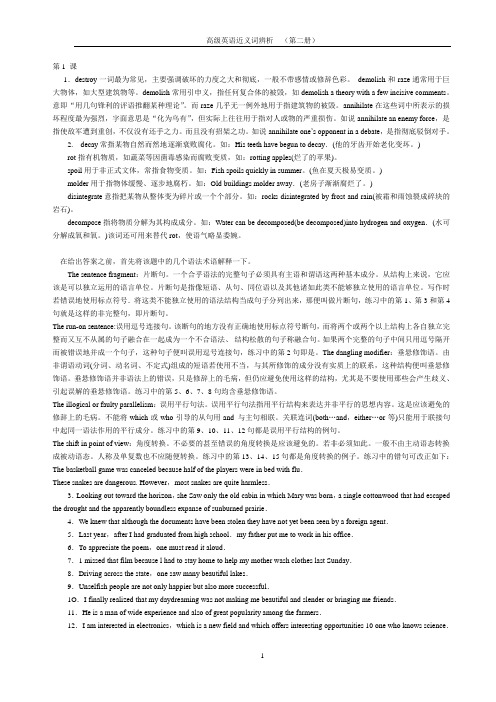
第1 课1.destroy一词最为常见,主要强调破坏的力度之大和彻底,一般不带感情或修辞色彩。
demolish和raze通常用于巨大物体,如大型建筑物等。
demolish常用引申义,指任何复合体的被毁,如demolish a theory with a few incisive comments。
意即“用几句锋利的评语推翻某种理论”。
而raze几乎无一例外地用于指建筑物的被毁。
annihilate在这些词中所表示的损坏程度最为强烈,字面意思是“化为乌有”,但实际上往往用于指对人或物的严重损伤。
如说annihilate an enemy force,是指使敌军遭到重创,不仅没有还手之力。
而且没有招架之功。
如说annihilate one’s opponent in a debate,是指彻底驳倒对手。
2. decay常指某物自然而然地逐渐衰败腐化。
如:His teeth have begun to decay.(他的牙齿开始老化变坏。
)rot指有机物质,如蔬菜等因菌毒感染而腐败变质,如:rotting apples(烂了的苹果)。
spoil用于非正式文体,常指食物变质。
如:Fish spoils quickly in summer。
(鱼在夏天极易变质。
)molder用于指物体缓慢、逐步地腐朽。
如:Old buildings molder away.(老房子渐渐腐烂了。
)disintegrate意指把某物从整体变为碎片或一个个部分。
如:rocks disintegrated by frost and rain(被霜和雨蚀裂成碎块的岩石)。
decompose指将物质分解为其构成成分。
如:Water can be decomposed(be decomposed)into hydrogen and oxygen.(水可分解成氧和氧。
)该词还可用来替代rot,使语气略显委婉。
在给出答案之前,首先将该题中的几个语法术语解释一下。
高中英语知识点归纳词汇近义词的辨析
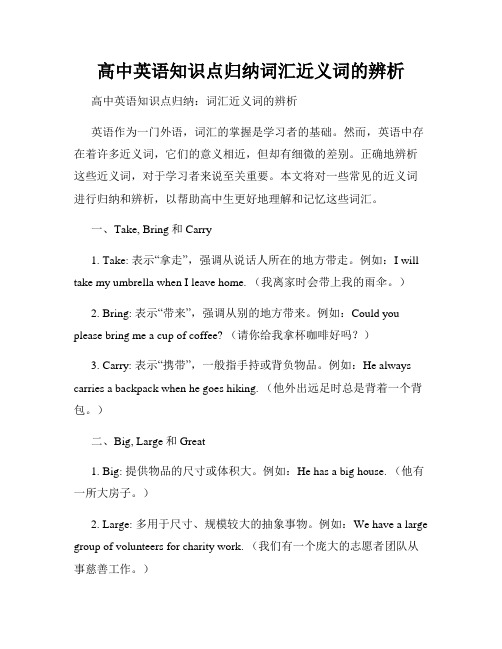
高中英语知识点归纳词汇近义词的辨析高中英语知识点归纳:词汇近义词的辨析英语作为一门外语,词汇的掌握是学习者的基础。
然而,英语中存在着许多近义词,它们的意义相近,但却有细微的差别。
正确地辨析这些近义词,对于学习者来说至关重要。
本文将对一些常见的近义词进行归纳和辨析,以帮助高中生更好地理解和记忆这些词汇。
一、Take, Bring和Carry1. Take: 表示“拿走”,强调从说话人所在的地方带走。
例如:I will take my umbrella when I leave home. (我离家时会带上我的雨伞。
)2. Bring: 表示“带来”,强调从别的地方带来。
例如:Could you please bring me a cup of coffee? (请你给我拿杯咖啡好吗?)3. Carry: 表示“携带”,一般指手持或背负物品。
例如:He always carries a backpack when he goes hiking. (他外出远足时总是背着一个背包。
)二、Big, Large和Great1. Big: 提供物品的尺寸或体积大。
例如:He has a big house. (他有一所大房子。
)2. Large: 多用于尺寸、规模较大的抽象事物。
例如:We have a large group of volunteers for charity work. (我们有一个庞大的志愿者团队从事慈善工作。
)3. Great: 表示程度或重要性大,用于描述非常好、重要或杰出的人或事物。
例如:She is a great singer. (她是一位伟大的歌手。
)三、Affect和Effect1. Affect: 作动词,表示“影响”。
例如:The bad weather will affectour travel plans. (恶劣的天气会影响我们的旅行计划。
)2. Effect: 作名词,表示“效果”,或作动词,表示“产生效果”。
- 1、下载文档前请自行甄别文档内容的完整性,平台不提供额外的编辑、内容补充、找答案等附加服务。
- 2、"仅部分预览"的文档,不可在线预览部分如存在完整性等问题,可反馈申请退款(可完整预览的文档不适用该条件!)。
- 3、如文档侵犯您的权益,请联系客服反馈,我们会尽快为您处理(人工客服工作时间:9:00-18:30)。
14. Her desk was all cluttered with old papers, strings, and other odds and ends.
Wear: [transitive] to have something such as clothes, shoes, or jewellery on your body
Dress: to put clothes on yourself or someone else dressed in
odds and ends: small things of various kinds without much value(零星东西)
15. He thinks they are extremely idealistic, for all their pragmatism.
Idealistic, ideal: see number 6
Wholesome: likely to make you healthy
Noisome: very unpleasant
13. He was born in a small town inhabited by about 500 people.
Live: if you live in a place, you have your home there
Mix: if you mix two or more substances or if they mix, they combine to become a single substance, and they cannot be easily separated
Blend: to combine different things in a way that produces an effective or pleasant result, or to become combined in this way
Arrogant: behaving in an unpleasant or rude way because you think you are more important than other people
3. Even if you blend oil and water, they will not mix.
Terrified: very frightened; scared(表被动)
18. “If you finish all the homework tonight, we’ll go for a picnic tomorrow,” he coaxed.
Admonish: (formal) to tell someone severely that they have done something wrong
Appeal: a quality that makes people like something or someone(强调一方吸引另一方)
17. The girl looked at the doctor terrified. PS:形容人ED,形容事/物ING.
Terrifyingly: extremely frightening; scary(表主动)
Debate: (transitive) to discuss a subject formally when you are trying to make a decision or find a solution
2. It was a proud moment for my cousin when she shook hands with the President.
Apprehension: anxiety about the future, especially about dealing with something unpleasant or difficult; anxiety
Coax: to persuade someone to do something that they do not want to do by talking to them in a kind, gentle, and patient way
19. He thought their behavior was contemptible, but he didn’t say anything in front of the host.
Contemptuous: showing that you think someone or something deserves no respect
Contemptible: not deserving any respect at all
20. Summoned by the boss, he approached his office full of apprehension.
Jumble: to mix things together in an untidy way, without any order(及物动词经常用于被动,不能作表语)
Clutter: to cover or fill a space or room with too many things, so that it looks very untidy(与with搭配)
8. Deep at night, they could still hear gun-fire rumbling in the distance.
Ramble: to talk for a long time in a way that does not seem clearly organized, so that other people find it difficult to understand you; To go on a walk in the countryside for pleasure
Proud: feeling pleased about something that you have done or something that you own, or about someone or something you are involved with or related to
Ideal: the best or most suitable that something could possibly be
7. Filled with great admiration for their integrity and courage, he was determined to be a man like them.
6. Do you think those young people are idealistic or pragmatic?
Idealistic: believing that you should live according to high standards and principles, even if they cannot really be achieved, or showing this belief
11. the little boy’s constant noise exasperated his father, who was busy writing a paper for a symposium.
Exhilarate: to make someone feel very excited and happy
Adulation: praise and admiration for someone that is more than they really deserve
Admiration: a feeling of great respect and liking for something or someone
4. Some people watch television so much that they cannot conceive of living without it.
Conceive: (formal) to imagine a particular situation or to think about something in a particular way
高级英语近义词辨析题汇总
上册(共128题)
1. The whole nation watched the two candidates debating the issue of raising taxes on TV.
Argue: (transitive) to state, giving clear reasons, that something is true, should be done etc
Rumble: to make a series of long low sounds, especially a long distance away from you
9. The professor looked over our papers with a hasty glance.
Exasperate: to make someone very annoyed by continuing to do something that upsets them
12. isn’t it noisome to live in a city with so many vehicles passing day and night?
